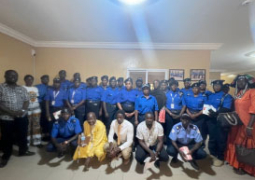Key stakeholders including the National Assembly’s FPAC and PEC, Accountant General, Internal Audit Directorate, Gambia Public Procurement Authority and Ministry of Finance attended the convergence as key stakeholders. Auditees, permanent secretaries, board chairpersons, executive directors, heads of finance and procurement also participated in the engagement.
The workshop was aimed to discuss major challenges faced in the audit process, the major recurring audit findings among others in order to discuss the causes as well as recommendations to address the identified gaps.
The interactions also included further sensitisation of the auditees on the mandate and work of the NAO as the Supreme audit institution of The Gambia; the roles and responsibilities of auditors and auditees as well as general recommendations/way forward on what the NAO and the auditees should do in order to better the audit service delivery process.
Modou Ceesay, the Auditor General in his opening remarks saidoftentimes there is public misconception about what NAO actually is.
“A National Audit/Supreme Audit Institution (SAI) of a country is established to promote accountability in the management and use of public resources,” he explained.
He added that financial audits are meant to provide assurance that an institution’s financial statements fairly reflect the revenues collected and expenditure incurred.
“However, the demands on SAIs have now expanded to include considerations of how well public bodies perform their work, typically looking at the economy, efficiency and effectiveness of the use of resources and service delivery,” he stated.
He pointed out that NAO’s four key StrategicDevelopment Plan (2020-2024) are increased compliance with laws and regulations (by auditees); better follow up on audit findings and recommendations; more informed and timely National Assembly discussion and action on audit reports; and greater public awareness of NAO’s roles and products.
He further said that the 12 principles of the International Organisation of the Supreme Audit Institutions (INTOSAI) on the value and benefits of SAIs areto make a difference to the lives of citizen.
“Citizens and their representatives increasingly demand SAIs to go beyond judgments of compliance and accuracy of financial transactions’ performance and the value for money obtained through public transactions,” Mr Ceesay also said.



